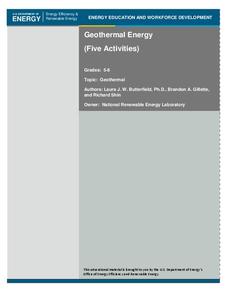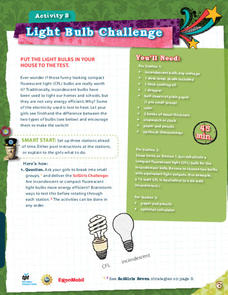Humane Education Advocates Reaching Teachers
Justice for All - Educating Youth for Social Responsibility: Grades K-5
In grades kindergarten through fifth grade, scholars take part in a social-emotional learning unit designed to boost social responsibility. Three hundred pages provide lessons and activities related to everyday classroom practices, the...
Environmental Protection Agency (EPA)
The Case of the Mysterious Renters
Upper-elementary kids examine the water usage in their own home, then use that data to solve a case in which a landlady is trying to determine how many people are living in an apartment being rented. Combine math, scientific method, and...
US Department of Energy
Geothermal Energy
With Earth Day quickly approaching, as well as many science fairs, why not challenge your class to investigate geothermal energy or other renewable energy resources? There are five driving questions explored in depth here, as well as...
Baylor College
Can Nutrients in Water Cause Harm?
Ecology candidates culture pond water organisms over a few days time, then they experiment to find out how increasing nutrients affects the population. As part of a unit on water, this exploration gives your class an understanding of how...
K20 LEARN
Ecosystems, Human Activity, And Interactions, Oh My!: Human/Environment Interaction
Word clouds about ecosystems hook learners into a lesson that explores Yellowstone wildlife. Young scientists create cause-and-effect relationships after examining data and recommend solutions to their observed problems. More data...
Bonneville
Probes of Prior Knowledge
A bright future learning about electricity awaits. Future scientists conduct two probes to investigate electrical energy. The first requires them to think about how electricity is made, while the second has them identify appliances that...
Bonneville
Design and Engineer Solutions
What's the best way to collect all that trash? A culminating activity has scholars use the knowledge and skills from the unit to design a solution to the plastic trash island problem. They use 3-D pens or a 3-D printer to build models of...
Bonneville
Engineering 101
Make a structure too sturdy to fail. Scholars first watch a video and consider the reasons for the Tacoma Narrows bridge collapse. They take part in two engineering challenges, one using newspapers and the other using spaghetti sticks...
Bonneville
The Problem of Plastic Trash Islands
Trash collection can be a hassle, especially out in the ocean. The second of four parts in the Adrift in a Sea of Plastic unit has pupils research plastic trash islands in marine ecosystems. They investigate why they occur and potential...
Bonneville
TinkerCAD: Introduction to 3D Printing
Steer young minds to build better boats. Future engineers first spend a few days exploring the TinkerCAD software and completing some embedded lessons. They then design sea crafts with buoyancy in mind and print them using a 3-D printer.
PBS
Out and About
Field guides are a like a window into an ecosystem. Young scientists collaborate to create their own field guides by recording observations from a local ecosystem. Ideally, they collect information over time to create a more complete...
PBS
Light Bulb Challenge
Efficiency equals money where homes are concerned. A comparative lesson asks learners to measure heat output of incandescent and compact fluorescent light bulbs. They follow their investigation with calculating the cost of using the two...
PBS
Going Green
Trash is where it's at! Using bags of garbage collected from the school, learners sort the contents into categories based on type of material and collect data on the results. The data may include weight, volume, and/or percent of the trash.
PBS
Bird is the Word
Tracking area birds can tell a lot about an ecosystem. Learners use that understanding as motivation to observe and record bird populations in their area. They use journaling to store their information and ultimately choose one bird as...
PBS
All Tangled Up
It is a tangled web the ecosystem weaves. Learners begin an activity on ecosystem interactions by building a food chain and then a food web with yarn as a group. To finish, they research local environmental changes that may impact the...
PBS
Season Seeking
It's a time of change. A hands-on activity engages young scientists in a lesson highlighting the change of seasons. They brainstorm indicators of season changes in nature and then look for them. Next, they record observations in a field...
PBS
Cloud Clues
It's cloudy with a good chance of learning! An inquiry-based lesson begins with an exploration of transparent, translucent, and opaque materials. Young scientists then connect their learning to the different cloud types as they take the...
Aquarium of the Pacific
Sensational Sharks
Pray that you are not the prey of sharks! The class watches a video and a webcam on sharks and make observations about the different types of sharks. Learners compare two sharks and list their similarities and differences. They then...
National Wildlife Federation
Water, Water Everywhere?
Visibly display the location of the water in the world. Using 12 liters of water to represent the total amount of water in the world, the class measures out the water located in different areas, such as the ocean and ice caps. Class...
National Wildlife Federation
Plastic in the Sea
How much plastic do people use? Class members identify how plastic is involved in their daily lives by looking at food packaging either at a grocery store or at home. Learners view statistics for the amount of plastics found on a beach...
Arbor Day Foundation
Trees: A Joy Forever
This Arbor Day, put on a show! A three-scene play follows a boy and girl that run into Arbor Day founder, J. Sterling Morton. Morton describes how the holiday came to be and discovers how his hard work has grown into a national...
Teach Engineering
Sugar Spill!
Sugar isn't good for you, but it's great for yeast! Scholars design an experiment to investigate how variables affect the rate of sugar consumption in yeast. The last installment of a nine-part Life Science unit considers how scientists...
Teach Engineering
Clean it Up!
Harness the power of bacteria. Scholars see how using organisms that exist in nature can help solve human problems in the process known as bioremediation. They research and discuss several successful examples, such as using oil-eating...
Channel Islands Film
Restoration Channel Islands Debate
Introduce learners to the debate format with an activity that uses the National Park Service's controversial Channel Islands restoration program as a topic. Class members learn how to generate provocative debate questions, how to prepare...

























